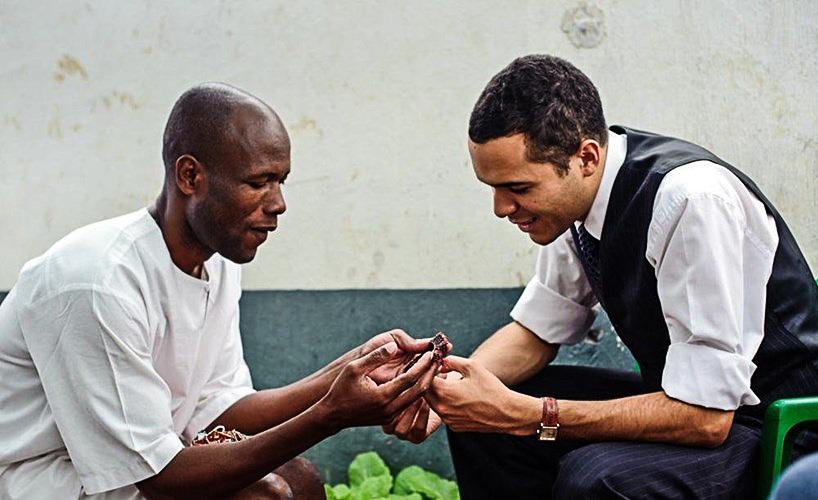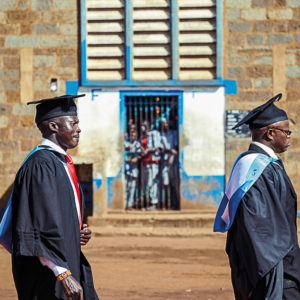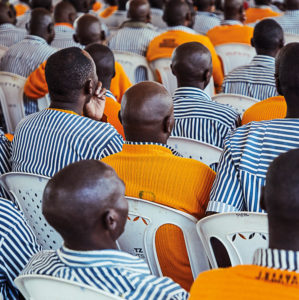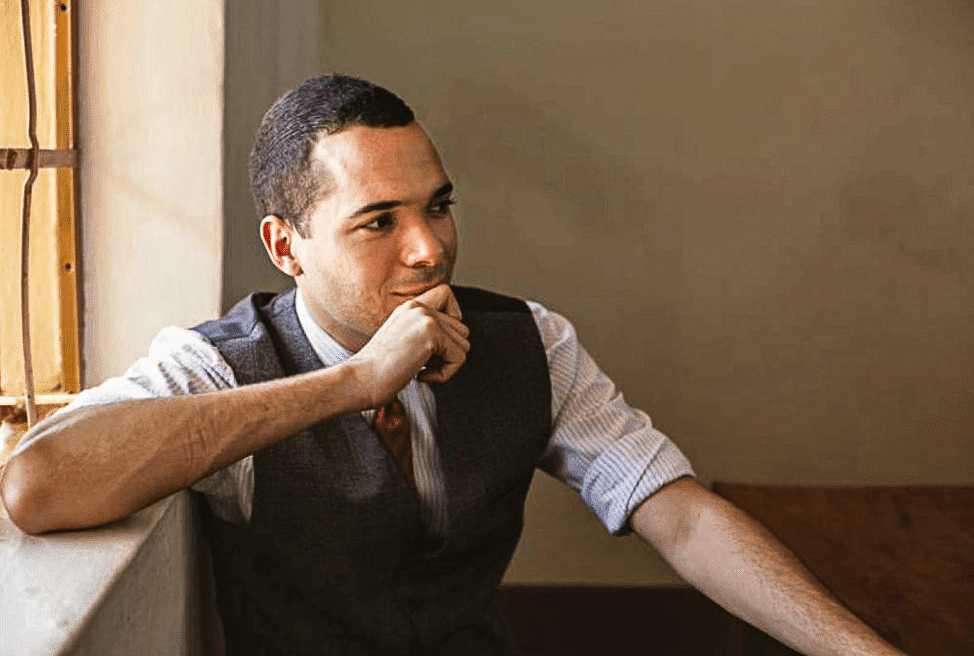2021 Iowa College Media Association award winner, Third Place – Best Print/Online Profile
In the early years of Alexander McLean’s life, while he was volunteering at a hospice in Uganda, building a prison library in Kenya and founding a charity that has now helped thousands of people across four African countries, his father asked him a question: “Why can’t you just be a normal son?”
McLean is still not normal.
He is a Senior TED Fellow, Ashoka Fellow and UK Young Philanthropist of the Year. In 2013 he was named one of TIME’s 30 Under 30 Changing the World and he has appeared in the “Powerlist” of Britain’s most influential people of African and African-Caribbean descent. He is also the most recent winner of The Grinnell College Innovator for Social Justice Prize, officially awarded to him on Friday, Oct. 30.
Despite these accolades, he remains studiously humble. “We have a lot of adventures,” McLean said of the organization he founded at 21, Justice Defenders, in an interview with The S&B.
“There was no grand plan for me, and starting this organization certainly wasn’t part of any plan,” said McLean. “It evolved organically. And that seems to be how my life in this organization is developing.”
Changing points
In a Zoom interview, McLean is dressed neatly in a white button-down shirt. He apologizes when he’s a minute late – “Sorry to keep you waiting” – and leans forward to listen to questions. He takes his time when he speaks, and if he’s thinking particularly hard, he shuts his eyes and continues with them closed.
McLean can’t be neatly categorized. His father is a Jamaican immigrant to the U.K. and his mother was born and raised there. He didn’t grow up with money, yet he found himself at Kingston Grammar School and then the University of Nottingham. He spends time in Africa working with African prisoners and in England among the wealthy elite who fund his work. Yet McLean is not African nor has he ever been in prison, and he’s not a natural socialite.

This leaves McLean in somewhat of a middle ground. “Typically, when people look at me, they just see me as being other from them,” McLean explained, particularly as a mixed-race person. In the United Kingdom, most people see McLean as Black, he said; in African countries, they see him as white. He remembers that when he first arrived as a volunteer at a Ugandan hospice, a nurse approached him and asked, “Can you give injections? Because the patients love to be injected by a white.”
McLean admitted that navigating this ambiguity can be challenging, but he also sees it as a gift.
“When you’re in such a position, you can choose to see your shared humanity with no one or with everyone,” he said. “And so, I think being mixed race has been a gift to me in terms of helping me make the choice to identify with anyone that I come across.”
Early on in life, McLean made the decision to identify with the marginalized. At 18, he traveled to Uganda to volunteer at a hospice. He described the experience of caring for people in the last days of their life as “a changing point” for him.
“I realized I could learn a lot from people who are dying,” he said.
In his Grinnell Prize acceptance speech, McLean recounted caring for one patient who had a particular impact: “I saw a man lying on the floor by the toilet, and he was naked lying on a plastic sheet in a pool of urine. The flesh on his bottom and back was rotten down to the bone, because he didn’t have any money, he didn’t have any relatives, so he got no care,” said McLean. “I ended up spending a number of days trying to wash this man and feed him and advocate for him. And I came one day, and he’d died the night before.”
After the man was carried away to be buried in a mass grave, McLean decided he needed to see where the man had lived before arriving at the hospital: Luzira Prison. What he found there formed a changing point in his life. In 2011, just a few years after McLean’s first visit to Uganda, a Human Rights Watch report detailed disturbing conditions in the Ugandan prison system, including forced labor, violence and rampant disease. Today, the Ugandan prison system is at more than 300 percent capacity, and almost 50 percent of those in prison are pre-trial detainees, meaning they have not been convicted of a crime.
In Luzira and at prisons like it, McLean described seeing cells that are standing room only, where prisoners are “wedged together like slaves” and where women worry about giving birth on the floor. There was not much McLean could do to address the systemic issues he observed, but there was one area in which he thought he could help: the prison hospital, which was woefully unequipped to care for the prisoners and needed to be refurbished.
So, during McLean’s gap year between secondary school and university, he raised money and worked with prisoners and prison officers to refurbish the hospital. In the year after refurbishment, the death rate at the Luzira hospital dropped to 12 from 144 the year before, according to McLean.
I realized I could learn a lot from people who are dying. – Alexander McLean
The next year, he began school at the University of Nottingham, but his work in African prisons continued. During breaks he traveled to Uganda, Kenya and Sierra Leone to continue his outreach. He organized book drives to build and stock prison libraries (a project inspired by the classic movie, The Shawshank Redemption). He gathered friends, family and fellow students to help.
Then came another changing point. During his second year of university, McLean learned he’d been nominated for the U.K. Charity Volunteer of the Year Award. There was just one problem: he needed a charity.
“[We] didn’t have one,” McLean explained. “So, we said, ‘Well, let’s call ourselves the African Prisons Project, because it does what it says on the tin.’ So, we did.”
The next year McLean officially registered the African Prisons Project as a U.K. charity.
Defenders of the defenseless
Since its inception, McLean’s organization (which adopted its new name, Justice Defenders, in 2019) has done a wide range of work. It has helped build libraries, remodel health clinics, run prison education programs and more, always adapting to what is needed most. During the COVID-19 pandemic, Justice Defenders has advocated for prisoners who are “terrified” of the virus spreading inside prisons, McLean said.

But in recent years Justice Defenders has focused on educating prisoners on the law. McLean trained as a lawyer by correspondence after founding Justice Defenders from Africa and still works as a magistrate in England. In his time working with prisoners, he said he’s come to realize that “rather than making prisons better for those who don’t necessarily need to be in them,” he needed to “go to the root of the problem … and see how we make sure that the defenseless are the defended.”
In partnership with the University of London, as well as other organizations, Justice Defenders helps to train prisoners as lawyers and paralegals, even forming legal offices inside prisons themselves, staffed by prisoners and prison officers. In 2019, Justice Defenders oversaw 327 paralegals working in 39 prisons. Due to Justice Defenders’ work, 23 of its students have gained a Bachelor of Law degree from the University of London, 100,000 people have attended its “legal awareness sessions” and 150 convictions have been overturned.
But McLean is careful not to take too much credit for these figures, instead pointing to the prisoners themselves as the arbiters of their success. McLean describes himself as a “servant lawyer” who wants to be “quick to listen, slow to talk.”
“I think the number one lesson I’ve learned now is to get out of the way myself, and actually to let those in prison or from prison do the talking, because they can do so far more eloquently than I can,” McLean said.
At Friday’s award ceremony, McLean accepted the Grinnell Prize “on behalf of the community of prisoners and ex-prisoners, prison officers, lawyers, judges and allies which I serve alongside.” He played video messages from Justice Defenders’ students Hesbon Onyango, Priscilla Cherono and Gibson Makini, who spoke about the challenges of studying in prison as well as the hope they have for the future.
McLean argues that it is imperative that justice systems include the voices of those who “know what it’s like to be beaten by the police, or to have their fingernails pulled in the police station, or to be imprisoned for years without a trial, or to have pepper spray sprayed on them for no reason.” And Justice Defenders aims to do just that.
“That vivid personal experience can lead to determination and perseverance and sense of conviction, which can be very, very powerful,” McLean said.
“The reality is that we’re working with some of the world’s poorest, most vulnerable people,” said McLean. “But we see them getting the highest marks you can get with the University of London, one of the world’s best universities. And I think that the world could do more to celebrate Black academic excellence and Black legal excellence, and I see it before my eyes.”
A summer of reflection
The work of celebrating Black excellence has become even more relevant this summer, as high-profile police killings of Black Americans inspired a global resurgence in the Black Lives Matter movement. Part of that movement involves putting Black voices front and center and celebrating their work, something McLean said Justice Defenders works hard to do. But he also said that the movement has impacted him personally, not just in the way he views his work, but also in the way he views himself.
“I think as a Brown man leading in these areas, sometimes I’ve had to compromise myself in a way that in the past I felt was inevitable. And now, since George Floyd’s death and conversations around Black Lives Matter, I realized that it doesn’t have to be that way,” said McLean, reflecting in particular on the racism he has endured as a mixed-race leader in primarily white spaces.
I think that the world could do more to celebrate Black academic excellence and Black legal excellence, and I see it before my eyes. – Alexander McLean
McLean recalled a history teacher who refused to back his application to study at Oxford, being asked why he hadn’t joined a gang or become a drug dealer and the time when he was “locked up” by British prison officers because they couldn’t believe he was a magistrate, not a prisoner. He spoke of a potential donor to Justice Defenders who at one point turned to McLean and said, “You know, the thing about you third world people is you always think you’re much better than you actually are.”
“I guess I’m pretty good at biting my tongue,” McLean remembered, grimacing.
But this summer’s racial reckoning has prompted McLean to have conversations with Black and Brown leaders in his field. Those conversations have given him hope. “It’s been, for me, very powerful speaking to other Brown and Black men and women leaders about how we’re shifting in our perceptions of ourselves and what’s possible and what change looks like,” McLean said.
The Grinnell Prize selection committee decided to award McLean the Prize in April, well before systemic racism took centerstage in the United States, but now that it has, McLean’s win takes on greater significance. But even as Grinnell awards the Grinnell Prize to an advocate for prison reform, the College has not officially addressed its practice of buying furniture from Iowa Prison Industries, a company that pays prisoners well below minimum wage for their labor. That’s a practice many students argue is akin to modern slavery, especially as the prison population in Iowa is disproportionately Black, and they want the College to forgo any future purchases.
McLean did not directly weigh in on the issue, saying, “The conversations that are taking place at Grinnell are important ones. I think the questions that are being asked are right.”
McLean did note the importance of gaining skills and knowledge in prison, as well as how important having a purpose and the chance to interact with others is, both in terms of reducing recidivism and improving wellbeing. But he also maintained that “when prisoners are being used to create items for sale, I think it’s important they’re treated fairly, and they’re given pay.”
It’s been, for me, very powerful speaking to other Brown and Black men and women leaders about how we’re shifting in our perceptions of ourselves and what’s possible and what change looks like. – Alexander McLean
McLean didn’t mince words when addressing the United States’ criminal justice system as a whole: “I don’t see anything around the world that’s as intentionally brutalizing as the American justice system,” McLean said. “Heartbreaking doesn’t really do it justice. I can’t get my head around how a country can spend so much money designing a justice system which inflicts so much pain and does so much damage.”
For McLean, developed countries such as the United States have a lot to learn from developing countries.
“What does it look like for development to go from poor countries to wealthy countries?” asked McLean. “Because actually, sometimes in places of great material poverty there’s tremendous innovation and resourcefulness, creativity and intellectual potential, which could have value in much wealthier countries.”
Work with no end
When asked about the future of Justice Defenders, McLean responds with a fervor that reveals his passion for his work hasn’t dissipated.

By 2030, Justice Defenders’ goal is to help one million people get fair hearings, but McLean doesn’t think those one million will be limited to African prisoners. He speaks passionately of expanding Justice Defenders’ work across the globe, in developing countries and in developed ones — in prisons, yes, but also in refugee camps and homeless shelters and brothels.
“Surely there must also be legal brains that can move mountains in those communities if given the chance,” McLean asserted. And during Friday’s ceremony, he said that being awarded the Grinnell Prize prompted him to think, “Now is the time to dream again.”
His dreams are lofty, and the work will be difficult, but McLean doesn’t shy away from it. He views the work as an almost religious calling, noting soberly that his name, Alexander, means “defender of men.” And in describing his commitment to the work of “defending the defenseless,” he paraphrases a passage from 2 Thessalonians 3:13: “We mustn’t get tired of doing work that has no end,” he said. “And I think that working for justice is endless work.”
After all the years McLean has been doing this work, he’s still not tired. And he’s still not normal.

























































Isaac • Nov 24, 2020 at 6:19 am
Super proud of you Alexander
Gareth Eeson • Nov 22, 2020 at 6:18 am
Excellent read well written and highlights a wonderful leader and inspiration in Alexander. A true gentleman and “defender of men” who finds time in his own life to help others and push for a great cause. I too am of mixed race and grew up in Zimbabwe, experiencing the mid-road of not being truly black or accepted by whites, but instead we forge a better path of merging the two and working endlessly with admirable passion. Now based in the UK I have witnessed many cultures and crossed paths with Alexander who has a presence and warmth that’s endearing. May you have the strength and blessings to continue your efforts Alexander and keep up the great work. Continue to spread your smile and shine.
Beverley Lucas • Nov 19, 2020 at 9:20 pm
Alexander, we are all so very proud of you and all of the hard work in which you have put into Justice Defenders.
Congratulations on accepting the Grinnell Prize “on behalf of the community of prisoners and ex-prisoners, prison officers, lawyers, judges and allies which you serve alongside.”
This is your world Alex, you are definitely shaping it.
Well done to the Co-Editor-in-Chief, Seth Taylor on his well written bio.